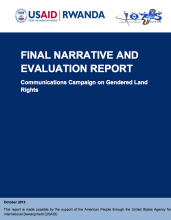Land Library
Welcome to the Land Portal Library. Explore our vast collection of open-access resources (over 74,000) including reports, journal articles, research papers, peer-reviewed publications, legal documents, videos and much more.
/ library resources
Showing items 1 through 9 of 225.Quality information on land is crucial to making good decisions about it. Increasing access to this information is important, and it is particularly vital to get it to groups who focus on social and environmental missions.
Shared Assets works with landowners and social and community enterprises to develop innovative ways of managing land for the common good, be it parks, farmland, woodlands, waterways, or other spaces. We also look for ways to create an environment that allows these models to thrive.
This report presents the results of a small scale household survey that was conducted in May
2015 to assess the extent to which rural Rwandan citizens are vulnerable or resilient to
environmental, market and land tenure risks and the level they understand the laws and rights
Residential land in Rwanda is scarce due to hilly terrain, a high population and a focus on agricultural growth to address food security concerns.
Between October 2014 and October 2015, Radio Ishingiro with the support of USAID
Land Project implemented a Communications Campaign focused on influencing the
attitudes and mindsets of men and boys about gender-equal land rights to overcome
This research, entitled "The Impact of Gendered Legal Rights to Land on the Prevalence and Nature of Intra- and Inter-Household Disputes" set out to interrogate the changing landscape of gendered land rights in Rwanda, and to examine the impact of the statutory changes introduced by laws governin
Rwanda has nearly 280,000 hectares of wetlands, almost 11% of the country’s total
area.1 These wetlands provide critical habitats for wildlife and biodiversity, maintain
important hydrologic processes that help to clean and protect ground and surface
At Shared Assets we believe that land is a common resource and that it should be made to work for everyone. This means using land to generate social, environmental, and economic value.
This research investigates the changing landscape of gendered land rights in Rwanda, and examines the impact of the statutory changes introduced by laws governing land, inheritance, succession and matrimonial property passed between 1999 and 2013.









